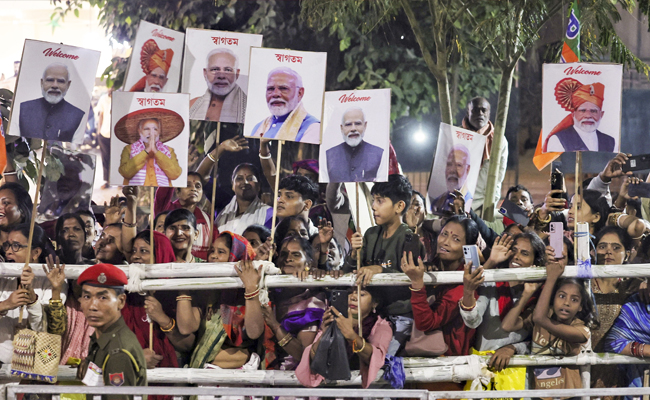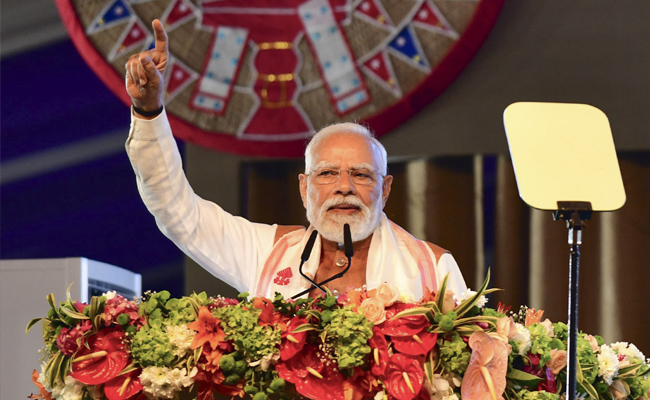New Delhi: The list of 43 members was released who were set to take oath as ministers in the reshuffled cabinet of ministers of PM Narendra Modi.
Udupi-Chikkamagaluru MP and BJP Karnataka’s General Secretary was also among the members who will be induced in the cabinet. Along with Shobha, three other MPs from Karnataka were also named in the list.
Rajeev Chandrasekhar, Bhagwanth Khuba, and A Narayanswamy were the four MPs from Karnataka who will take oath as the ministers on Wednesday evening.
Check the full list here.
1.Narayan Tatu Rane
2. Sarbananda Sonowal
3. Dr. Virendra Kumar
4. Jyotiraditya M Scindia
5. Ramchandra Prasad Singh
6. Ashwini Vaishnaw
7. Pashu Pati Kumar Paras
8. Kiren Rijiju
9. Raj Kumar Singh
10. Hardeep Singh Puri
11. Mansukh Mandaviya
12. Bhupender Yadav
13. Parshottam Rupala
14. G. Kishan Reddy
15. Anurag Singh Thakur
16. Pankaj Choudhary
17. Anupriya Singh Patel
18. Dr. Satya Pal Singh Baghel
19. Rajeev Chandrasekhar
20. Shobha Karandlaje
21. Bhanu Pratap Singh Verma
22. Darshana Vikram Jardosh
23. Meenakashi Lekhi
24. Annpurna Devi
25. A. Narayanaswamy
26. Kaushal Kishore
27. Ajay Bhatt
28. B. L. Verma
29. Ajay Kumar
30. Chauhan Devusinh
31. Bhagwanth Khuba
32. Kapil Moreshwar Patil
33. Pratima Bhoumik
34. Dr. Subhas Sarkar
35. Dr. Bhagwat Kishanrao Karad
36. Dr. Rajkumar Ranjan Singh
37. Dr. Bharati Pravin Pawar
38. Bishweswar Tudu
39. Shantanu Thakur
40. Dr. Munjapara Mahendrabhai
41. John Barla
42. Dr. L. Murugan
43. Nisith Pramanik
#JustIn | List of people who will be sworn-in today #CabinetReshuffle pic.twitter.com/IcnE6WQfCK
— NDTV (@ndtv) July 7, 2021
Let the Truth be known. If you read VB and like VB, please be a VB Supporter and Help us deliver the Truth to one and all.
More than 200 Indian nationals have joined the Russian armed forces since 2022, with 26 are confirmed dead, MEA—The Ministry of External Affairs have informed the Upper house of the Parliament: Rajya Sabha.
In a written response, the Minister of State for External Affairs, Kirti Vardhan Singh, has stated that at least 202 Indians are reported to have joined the Russian army. Among these recruited personnels, 26 have lost their lives; while, seven individuals have been reported missing by Russian authorities. He added that the remains of two deceased Indian nationals were cremated in Russia.
Singh noted that the sustained diplomatic efforts by the Indian government have led to the early discharge of 119 individuals. He further added that the discussions are going smoothly with the Russians to secure the release of the remaining personnel, with efforts underway to facilitate the early discharge of 50 more Indian nationals.
According to the minister, the Union government is in contact with Russian authorities to ensure the safety, welfare, and prompt return of Indian citizens serving in the Russian army. The issue, he said, is being addressed at multiple levels, including interactions between senior leaders, ministers, and officials of both countries.
The said disclosure was made in response to queries raised by Saket Gokhale, the MP of Trinamool Congress, and Randeep Singh Surjewala, the MP of INC, regarding the number of Indians allegedly recruited into the military service in Russia; Along with the details of deaths and missing persons reported since 2022.





